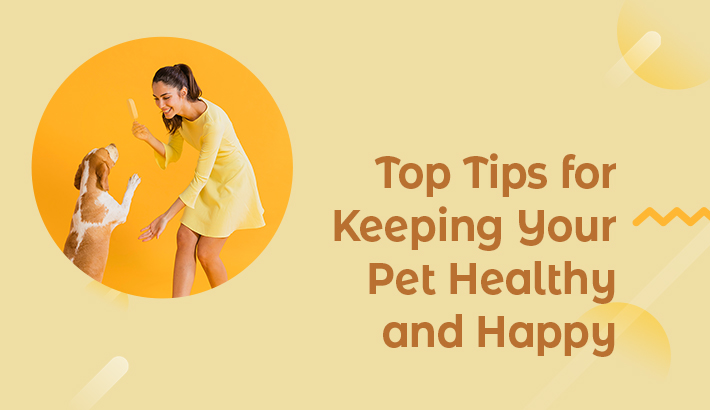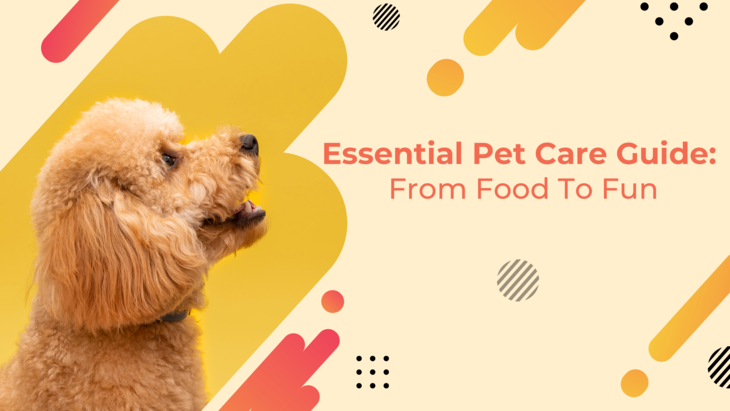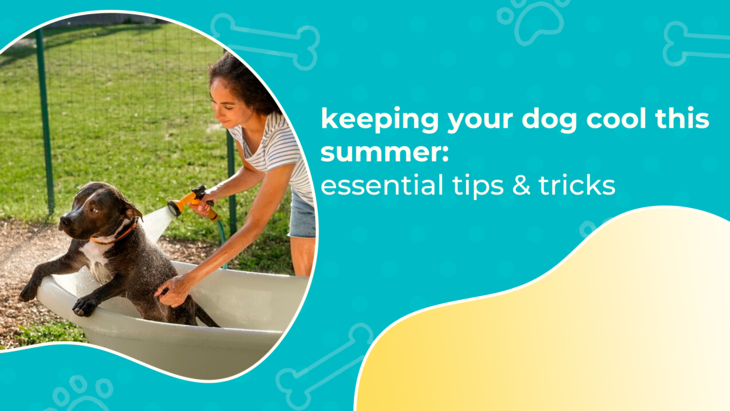Our animal companions are not just pets; they're beloved members of our families. As conscientious pet owners, it falls on us to guarantee that our furry, feathered, or scaled friends lead lives brimming with vitality and joy. Within the confines of this article, we'll delve into the essential strategies for maintaining your pet's well-being and contentment. We'll explore a range of aspects, from nutrition to exercise and grooming. So, without further ado, let's embark on this journey toward ensuring our pets' health and happiness.
Understanding Your Pet's Needs
Understanding your pet's needs is fundamental to providing them with a healthy and happy life. Just as humans have unique preferences and requirements, different animal species and breeds have their own specific needs.
For instance, a high-energy Border Collie requires ample exercise and mental stimulation, while a laid-back Persian cat prefers a quiet environment and regular grooming. Researching and consulting with a veterinarian or a breed specialist is essential to determine what your specific pet needs.
Consider factors like age, size, breed, and any existing medical conditions when addressing their needs. The key to developing a fulfilling and harmonious relationship with your furry, feathered, or scaly companion lies in catering to their individual needs, such as providing suitable food, establishing a safe and comfortable living space, as well as ensuring they receive adequate exercise and socialization. Remember that understanding and meeting your pet's needs is a crucial aspect of responsible pet ownership.
A Balanced Diet for a Happy Pet
A happy and healthy pet's life relies on a balanced diet as its cornerstone. Just like humans, our animal companions require a proper and nutritious diet to thrive. Providing your pet with the right food not only ensures their physical well-being but also contributes to their overall happiness.
A balanced diet for your pet should include all the essential nutrients, such as proteins, carbohydrates, fats, vitamins, and minerals. Your pet's dietary needs can differ based on their species, breed, age, and any preexisting health conditions. It's crucial to consult your veterinarian to determine the ideal diet for your furry friend.
If you choose to prepare homemade meals, it is crucial to collaborate closely with your veterinarian to guarantee that the diet is properly balanced and fulfills all of your pet's nutritional requirements.
Overall, a balanced diet is the key to your pet's happiness, longevity, and vitality. It's an expression of your love and care, ensuring that your pet leads a fulfilling and contented life.
Regular Exercise and Playtime
Regular exercise and playtime are vital components of maintaining your pet's overall health and happiness. Just like humans, pets need physical activity to stay fit and mentally stimulated.
Dogs, for instance, benefit from daily walks or runs in the park, which help them release energy, maintain a healthy weight, and strengthen their muscles. It's also a great opportunity for them to explore new scents and environments, keeping their minds engaged.
Cats, on the other hand, love interactive play with toys like feather wands or laser pointers. This not only keeps them physically active but also sharpens their hunting instincts.
Regular exercise not only helps prevent obesity and related health issues but also reduces behavioral problems that can stem from boredom or excess energy. So, whether it's a game of fetch, a hike in the woods, or a simple romp in the backyard, make sure your pet gets the exercise and playtime they need to strive for a joyful and nourishing life.
Grooming and Hygiene
Grooming and hygiene are essential aspects of pet care that go beyond just making your furry friend look good. Regular grooming ensures that your pet is comfortable and healthy. Brushing your pet's coat not only removes dirt and tangles but also stimulates their skin and promotes blood circulation. It's a bonding experience that helps you understand your pet's body and detect any lumps or abnormalities early. Additionally, trimming your pet's nails is crucial to prevent overgrowth, which can lead to pain and mobility issues. Maintaining clean ears and teeth is equally important for overall health. In summary, grooming and hygiene are vital for your pet's well-being, ensuring they look and feel their best.
Health Checkups and Preventive Care
Regular health checkups and preventive care are essential components of responsible pet ownership. These practices play a crucial role in ensuring your furry companion's well-being and longevity.
Health checkups, typically conducted by a licensed veterinarian, involve a comprehensive examination of your pet's overall health. During these visits, the vet will assess your pet's physical condition, look for signs of illness, and recommend necessary vaccinations. These checkups can help detect potential health issues early, allowing for prompt intervention and treatment.
Preventive care includes various measures to keep your pet healthy. This may involve routine vaccinations, parasite control, and dental care. Vaccinations protect your pet from common diseases, while preventive medications can safeguard them from parasites like fleas and ticks. Dental care is crucial for maintaining oral health and preventing dental problems that can lead to more significant health issues.
By prioritizing health checkups and preventive care, you can provide your pet with the best chance for a happy, healthy life. Regular veterinary visits and proactive measures ensure that your pet's well-being remains a top priority.
Dental Health Matters
Maintaining good dental health is crucial for your pet's overall well-being. Just like humans, pets can suffer from dental issues that, if left unaddressed, can lead to serious health problems. Dental problems can cause pain, discomfort, and even impact your pet's ability to eat and enjoy life.
Common dental issues in pets include gum disease, tartar buildup, and tooth decay. These problems can result in bad breath, swollen gums, and difficulty eating. In severe cases, untreated dental issues may lead to infections that can affect other organs in your pet's body.
To ensure your pet's dental health, regular dental care is essential. This includes brushing your pet's teeth, offering dental chews or toys, and scheduling professional dental cleanings with your veterinarian when needed. By taking care of your pet's oral health, you not only prevent dental problems but also contribute to their overall happiness and longevity.
Mental Stimulation and Enrichment
Mental stimulation and enrichment are crucial aspects of maintaining your pet's overall well-being. These activities are like brain workouts for your furry friend. Just as physical exercise keeps their bodies healthy, mental stimulation keeps their minds sharp and content.
Engaging your pet in mentally stimulating activities can prevent boredom, anxiety, and destructive behavior. For dogs, this can include puzzle toys, obedience training, and hide-and-seek games. Cats love chasing laser pointers, exploring cat trees, and solving treat puzzles.
Mental enrichment can be as simple as introducing new toys or rearranging their living space. These activities stimulate curiosity and problem-solving skills, ensuring your pet is both mentally and emotionally fulfilled.
By incorporating mental stimulation and enrichment into your pet's daily routine, you'll not only provide them with a source of joy but also create a stronger bond between you and your beloved companion. It's a win-win for both of you.
Socialization and Companionship
Socialization and companionship are essential aspects of keeping your pet healthy and happy. Just like humans, animals thrive on interaction and bonds. Socialization involves exposing your pet to different environments, people, and other animals, which helps them develop confidence and good behavior.
For dogs, it means enjoyable outings to the park, meeting other dogs, and being comfortable around various people. Cats benefit from playdates, as well as meeting other cats and being exposed to new stimuli. It's a chance for them to learn, adapt, and enrich their lives.
Companionship, on the other hand, refers to the emotional connection your pet forms with you and other animals. Pets, especially dogs, are known for their loyalty and desire to be with their human companions. For some animals, having a fellow pet in the house can also provide the necessary companionship, reducing loneliness.
Incorporating socialization and companionship into your pet's life ensures they are emotionally fulfilled, well-adjusted, and less likely to exhibit behavioral issues. It's a vital part of their overall well-being.
Safe and Comfortable Living Spaces
reating a safe and comfortable living space for your beloved pet is paramount to their overall well-being. Just as we want our homes to be cozy and secure, our pets also deserve a safe haven.
Start by pet-proofing your home, removing any potential hazards that could harm your furry friend. Secure toxic substances like cleaning chemicals, medications, and poisonous plants out of their reach. Keep small objects, which could be choking hazards, off the floor.
Offer a designated space for your pet to rest and relax, equipped with a comfortable bed or cushion. Ensure it's located in a quiet area, away from noisy appliances and disturbances.
Maintain a clean environment, regularly cleaning up pet hair, litter, or waste. This not only keeps your home fresh but also prevents potential health issues.
Consider temperature control, ensuring your pet is never too hot or too cold. Provide access to fresh water and shelter from extreme weather conditions if your pet spends time outdoors.
By creating a safe, comfortable, and loving living space, you're not only enhancing your pet's quality of life but also deepening the bond you share with your loyal companion.
Avoiding Common Pet Hazards
Keeping your pet safe means being aware of common hazards that can pose risks to their well-being. In your home, eliminate or secure toxic substances such as cleaning chemicals, poisonous plants, and small objects that pets might swallow. Store medications and chemicals out of their reach, and keep all hazardous items locked away.
When outdoors, be cautious of potential dangers. Avoid walking your dog in areas where there might be broken glass or sharp objects. Keep them on a leash in unfamiliar or busy places to prevent accidents. Ensure your backyard is escape-proof to avoid the risk of them wandering off.
Additionally, be mindful of extreme weather conditions. On hot days, protect your pet from heatstroke by providing shade and plenty of water. During cold weather, keep them warm with appropriate attire.
Prevention is key. By identifying and avoiding common pet hazards, you'll create a safer environment for your furry friend, reducing the risk of accidents and ensuring their continued health and happiness.
Signs of a Healthy and Happy Pet
A healthy and happy pet exudes vitality and contentment. Their coat or feathers are usually glossy and well-groomed, indicating good overall health. They exhibit a healthy appetite, eagerly eating their meals without any signs of pickiness or reluctance. Happy pets are often playful and engaged, enjoying interactive activities and showing enthusiasm during playtime.
Mentally, they are alert and curious, exploring their surroundings with interest. Their eyes are bright and expressive, conveying their emotional well-being. Content pets tend to be affectionate and seek human or other animal companionship, displaying trust and attachment to their owners or fellow pets.
These pets exhibit a good balance between rest and activity, enjoying their moments of relaxation as well as active engagement. Additionally, they have consistent bathroom habits and maintain an ideal body weight.
In summary, a healthy and happy pet is an active, vibrant, and content companion that forms a strong, affectionate bond with their owner while also displaying physical and mental well-being
Common Pet Problems and Solutions
Common pet problems can be a source of concern for pet owners. Issues like allergies, obesity, and anxiety are relatively prevalent among pets. Allergies can manifest as skin irritation, itching, and digestive problems. To address this, consult your veterinarian, who can recommend allergy testing and dietary changes to alleviate symptoms.
Obesity is another common issue, primarily linked to overfeeding and lack of exercise. To combat this, maintain a balanced diet and encourage regular physical activity for your pet.
Anxiety, often seen in pets when they are left alone, can lead to destructive behavior. Address this by gradually acclimating your pet to alone time, using comforting items, and considering behavioral training.
For any pet issue, it's crucial to consult your vet. They can provide tailored solutions to ensure your pet's health and happiness, offering guidance on treatment options, dietary changes, and behavior modifications to keep your furry friend in the best of health.
Conclusion
Ensuring the health and happiness of your beloved pet is a multifaceted journey that encompasses several key elements. Proper nutrition is the foundation of their well-being, as it directly affects their physical and emotional health. A balanced diet tailored to their age, breed, and specific requirements is paramount. Regular exercise and playtime are not just for physical fitness but also for mental stimulation. Engaging in activities your pet enjoys strengthens your bond and keeps them content. Grooming and hygiene practices are essential. Regular brushing, nail trimming, and dental care ensure their comfort and overall health. Frequent vet checkups and preventive care are vital for catching potential issues early and maintaining their longevity.
Understanding your pet's unique needs, whether they're a hyperactive dog or a low-maintenance cat, is the cornerstone of providing them with the care and love they deserve. In this holistic approach, you'll find the true secret to a happy, healthy life shared with your loyal companion.
Frequently Asked Questions
Q1. How often should I take my pet to the vet for checkups?
Regular vet visits are essential. For young, healthy pets, an annual checkup is usually sufficient, while older pets may need more frequent visits.
Q2. What's the best way to provide mental stimulation for my pet?
Puzzle toys, interactive feeders, and obedience training are great ways to keep your pet mentally engaged.
Q3. Can I feed my pet homemade food, or is commercial pet food better?
While homemade food can be an option, it's crucial to consult your vet to ensure it meets your pet's nutritional needs. Commercial pet food is formulated to provide a balanced diet.
Q4. How can I help my pet overcome separation anxiety?
Gradual desensitization, crate training, and leaving comforting items like a favorite toy can help ease separation anxiety.
Q5. What are the signs of a dental issue in my pet, and how can I prevent them?
Signs may include bad breath, swollen gums, and difficulty eating. Regular dental care, including brushing and providing dental chews, can help prevent dental problems.







Post Comments